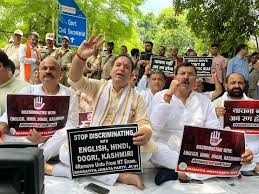BJP welcomes CAT stay on Urdu mandate for Naib Tehsildar posts in J-K

The Central Administrative Tribunal (CAT) recently stayed the mandatory Urdu requirement for Naib Tehsildar recruitment in Jammu & Kashmir. The Bharatiya Janata Party (BJP) welcomed the decision, calling it a step toward fairness and equal opportunity.
Background: Why the Urdu Rule Sparked Outrage
In 2009, the Jammu and Kashmir Services Selection Board (JKSSB) introduced a rule. It made knowledge of Urdu compulsory for Naib Tehsildar applicants. The requirement remained in place even after the 2019 abrogation of Article 370.
This mandate affected many candidates, especially those from the Jammu region. In these areas, Urdu isn’t widely spoken or taught in schools. Thousands of qualified aspirants found themselves ineligible due to language barriers.
BJP’s Opposition and Public Backlash
The BJP raised the issue through protests and formal channels. Party leaders like former legislator R.S. Pathania called the Urdu mandate discriminatory. The party argued that it unfairly disqualified youth who studied other official languages.
Protests erupted across Jammu. BJP members submitted memorandums to the Lieutenant Governor and held press briefings. They asked for equal opportunities for candidates fluent in Hindi, Dogri, English, or Kashmiri, the other official languages under the 2020 Jammu & Kashmir Official Languages Act.
Public interest litigations soon followed. Petitioners challenged the Urdu-only rule, calling it outdated and unjust.
CAT Steps In: Interim Relief for Aspirants
Earlier this month, the Central Administrative Tribunal passed an interim order. The order stayed the Urdu requirement until a full hearing. The tribunal noted that the rule appeared discriminatory under the 2020 Official Languages Act.
The CAT directed the JKSSB to accept applications from all graduates. These candidates must be fluent in any of the five official languages, not just Urdu. The next hearing is scheduled for August 13, 2025.
BJP Applauds the Ruling
The BJP welcomed the order and called it a win for youth and justice. R.S. Pathania praised the CAT’s decision, emphasizing equal opportunity for all regions.
“Language must not block access to public jobs,” said Pathania. “We aren’t against Urdu, but no single language should dominate the recruitment process.”
The party believes that the decision reflects India’s constitutional values. It argued that recruitment must focus on merit, not linguistic background.
Voices From the Ground
Job aspirants across Jammu expressed relief. Many had felt disheartened by the Urdu-only rule. “I studied Hindi and Dogri in school. The Urdu condition shattered my hopes,” said Priya Sharma, a postgraduate applicant from Udhampur. “Now, I feel I have a real chance.”
Others pointed out that most administrative work happens in English or Hindi. They questioned why Urdu was required for a job that doesn’t rely heavily on that language.
Mixed Political Responses
Not all parties supported the CAT’s order. Regional parties like the National Conference and PDP previously backed the Urdu rule. They see Urdu as part of J&K’s administrative and cultural identity.
Still, some leaders within those parties suggested a balanced approach. “We must respect all official languages equally,” said a senior NC leader. “No one should face exclusion based on language.”
What This Means for Future Recruitment
The CAT’s order could reshape public sector hiring in Jammu & Kashmir. If the tribunal upholds the interim ruling, future job notifications will likely include all official languages as valid options.
This development could also influence other Indian states. Some regions continue to face criticism over language-based exclusions in public service exams.
The decision aligns with broader national goals. These include promoting diversity, fairness, and access to employment without bias.
A Larger Shift in Governance
This moment reflects a deeper shift in how Jammu & Kashmir is governed. Since the revocation of Article 370, policies aim to ensure inclusivity and national integration.
Language plays a key role in that process. But instead of enforcing a single language, governance must acknowledge the region’s linguistic diversity. Candidates from Jammu, Kashmir, and Ladakh deserve equal treatment regardless of their mother tongue.
Conclusion: Justice and Opportunity Prevail
The BJP’s support for the CAT’s decision highlights its ongoing push for fair employment practices. By challenging the Urdu-only rule, the party has made a clear statement: no youth should be denied opportunity due to language.
As the case returns to the tribunal in August, many will watch closely. But for now, thousands of young aspirants can breathe a sigh of relief. They finally have a fair shot at contributing to the administration of their homeland.ow, the stay offers hope to thousands of deserving candidates who only wish to serve their union territory without being disqualified by an outdated language clause.






